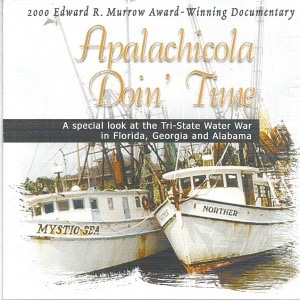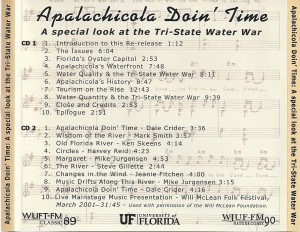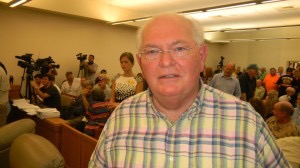By Elle Newbold and Donna Green-Townsend on August 13th, 2013
The full Senate Field Hearing on the Effects of Water Flows on the Apalachicola Bay Short and Long-term Perspectives can be viewed on the link below: (recorded in the Franklin County Courthouse Annex on August 13th, 2013) http://thefloridachannel.org/video/81313-u-s-senate-committee-on-commerce-science-transportation-field-hearing-effects-of-water-flows-on-apalachicola-bay/
Or to hear highlights click on the video below:

 Click to hear the 2000 Edward R. Murrow Award-Winning documentary on “Apalachicola Doin’ Time” produced by WUFT’s Donna Green-Townsend, Bill Beckett, Daniel Beasley and Josh Azriel.
Click to hear the 2000 Edward R. Murrow Award-Winning documentary on “Apalachicola Doin’ Time” produced by WUFT’s Donna Green-Townsend, Bill Beckett, Daniel Beasley and Josh Azriel.
Updated: After joining Rubio and Nelson Tuesday in Apalachicola, Gov. Rick Scott announced the state would sue Georgia over its water usage.
“This lawsuit will be targeted toward one thing – fighting for the future of Apalachicola. This is a bold, historic legal action for our state. But this is our only way forward after 20 years of failed negotiations with Georgia. We must fight for the people of this region. The economic future of Apalachicola Bay and Northwest Florida is at stake,” he said in a statement.
The suit will be filed in the U.S. Supreme Court and will seek to limit the amount of Apalachicola headwaters Georgia can use.

A five-minute audio interview by Donna Green-Townsend with State Sen. Bill Montford (D-District 6) can be heard below. He discusses how the Apalachicola Bay will be a priority in the state legislature and his hopes for the federal government to take a stronger interest in the Tri-State Water War involving Alabama, Florida and Georgia over the river system they all share. Montford also addresses the criticism of those who say besides the drought in 2012, oysters were overharvested just after the BP oil spill.
Original story: There was much emotion Tuesday at the congressional field hearing scheduled to examine the lack of water flow into the Apalachicola Bay.
Due to decreasing levels of water flow into the bay from the Apalachicola watershed, the town’s once-thriving oyster industry has collapsed. The town of Apalachicola, known for its oysters, has reported that this season has found an insignificant amount of the mussels to be harvested from the bay.
The Florida Department of Environmental Protection calls the Apalachicola one of the most productive bays in the nation, providing approximately 90 percent of the oysters consumed in Florida. In addition to oysters, the bay supports extensive shrimping, crabbing and commercial fishing. Only 20 percent of the river lies in Florida, according to FDEP. The Apalachicola River headwaters, which actually begin in Georgia’s Chattahoochee River, becomes the Apalachicola where it crosses the Florida-Georgia line.
U.S. Sen. Marco Rubio scheduled the field hearing at the Franklin County Courthouse in Apalachicola to hear evidence concerning the oyster collapse. Speakers blamed the collapse on last year’s drought and poor water conservation practices in Georgia along the Chattahoochee river.
Senators Bill Nelson and Marco Rubio headed the field hearing because Congress has the authority to direct the U.S. Army Corps of Engineers to provide the freshwater flows necessary to save the Apalachicola Bay.
(pictures from the day’s hearing below: Senate Committee on Commerce, Science and Transportation, Full Committee Field Hearing on “Effects of Water Flows on Apalachicola Bay: Short and Long Term Perspectives.” August, 13, on August 13th, 2013 2013, Franklin County Courthouse Annex Bldg.